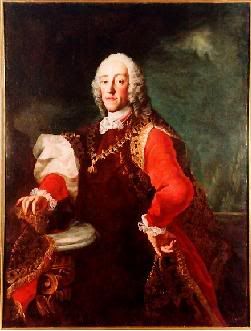George I of Falastur

| |
| Reign | 1st of February, 1755 - 23rd of December, 1781 |
| Coronation | 21 April, 1755 |
| Predecessor | Edward I |
| Successor | James I |
| Spouse | Marie-Amelie |
| Issue | none |
| Royal House | Terila |
| Father | Edward I |
| Mother | Charlotte |
| Born | 18th of July, 1720 Imperial Palace Complex, Terila, Falastur |
| Died | 23rd of December, 1781 |
King George I of Falastur (1720-1781), known as The Glorious, ruled the Kingdom of Falastur from 1753, when his father, King Edward I proved to be unfit to rule, to his death in 1781. His reign was most notable for his very successful capture of the entire Falastur Island group after his father's complete failure to do the same. He also proved to be an astute administrator, and a hugely popular figure after his father, and his legacy of disregard for the citizens, expanding on the reforms of Edward I. However, although he married, he had no children, and after his death, the crown passed to his brother, James I.
Early Life
One of the first citizens to be born on Falastur, George lived a life far from the public eye for much of his childhood. For his first seven years, George enjoyed popular favour and celebrity with the peoples of Falastur, however after his father's abortive expansionist campaign, he along with his family were drawn into isolation from public sight while his father moped in his failure. During this time, George was educated with his siblings by a Governess brought from England, becoming an academic and virtuous child. His experiences with his father - now a bitter and short-tempered recluse - gave him a fear for his future as heir to the throne, and distanced him from his father. Instead, he practised tennis with his siblings and the small number of children amongst the new Falasturian nobility, and devoted time to his studies, aiming to avoid the reality that he would become his father in personality when he ascended the throne. Growing up seperated from the rest of Falastur, George became a quiet child, and was frequently commented as being "...very unsocial - a recluse like his father, albeit because he is made to be, not because he chooses so...". Due to this upbringing away from his peers, he was never skilled in speaking to the public, yet he made up for it with his administrative skill and panache for grandiose occasions. His divorce from Falasturian society is also supposedly a contributing factor to the staging of his many balls and social events, seen as a desperate plea to be accepted by the people of Falastur after his coronation.
As he grew older, George's father groomed him more and more to be ready to inherit the throne, teaching him how to lead sessions of the Council, to impose laws, and to ensure royal authority was upheld through force. Becoming increasingly disillusioned with his father and with his impending throne, George sought to distance himself from politics, instead becoming a reknowned scholar, and perfecting his sports, yet still he was kept out of the public's eye by his father. However, as he grew older, he was increasingly affected by Nobles who sought to make an impression on him to lay the path for influential positions after George's coronation. George slowly developed ideas for his reign, focusing around the successful conquest of the Falastur Island Group - this time using war as a last resort - around the relaxing of harsh restricting laws on the citizens, and on the establishing of international relations. Marrying Marie-Amelie of a French-descended Noble family when he was 24, in an act commonly seen as a political marriage although undeniably resulting in a loving relationship, George finally made the transition to King-in-the-making. Increasingly restless, he left his father's protective embrace, travelling around Falastur, helping to establish settlements further out on Falastur Island, and playing a part in developing relations with the few tribal groups remaining on the island. Spending the rest of his life before his coronation on acts of goodwill, he slowly built up a reputation for himself amongst the citizenry, laying the foundations for his popular support, yet his relations to his father made him feel unwelcome in many areas, and caused an air of suspicion around much of his actions. Finally, at the age of 33, he was forced to watch his father - now becoming increasingly irritable and paranoid about social unrest - brutally crush a rebellion. Seeing widespread public revolt on the cards, George took matters into his own hands, accelerating his rise to power. Returning to Terila, George made a public speech announcing the insanity of his father, and declaring that he would rule in his stead. He unofficially deposed his father, ruling as Prince Regent for two years before his father - now in a seriously low state of health - had himself sent to London, where Edward died mid-voyage. During the state of public mourning, which entailed non of the national grief that his grandfather's death had caused, George was crowned King George I of Falastur.
| Preceded by: Edward I |
King of Falastur 1753-1781 |
Followed by: James I |
